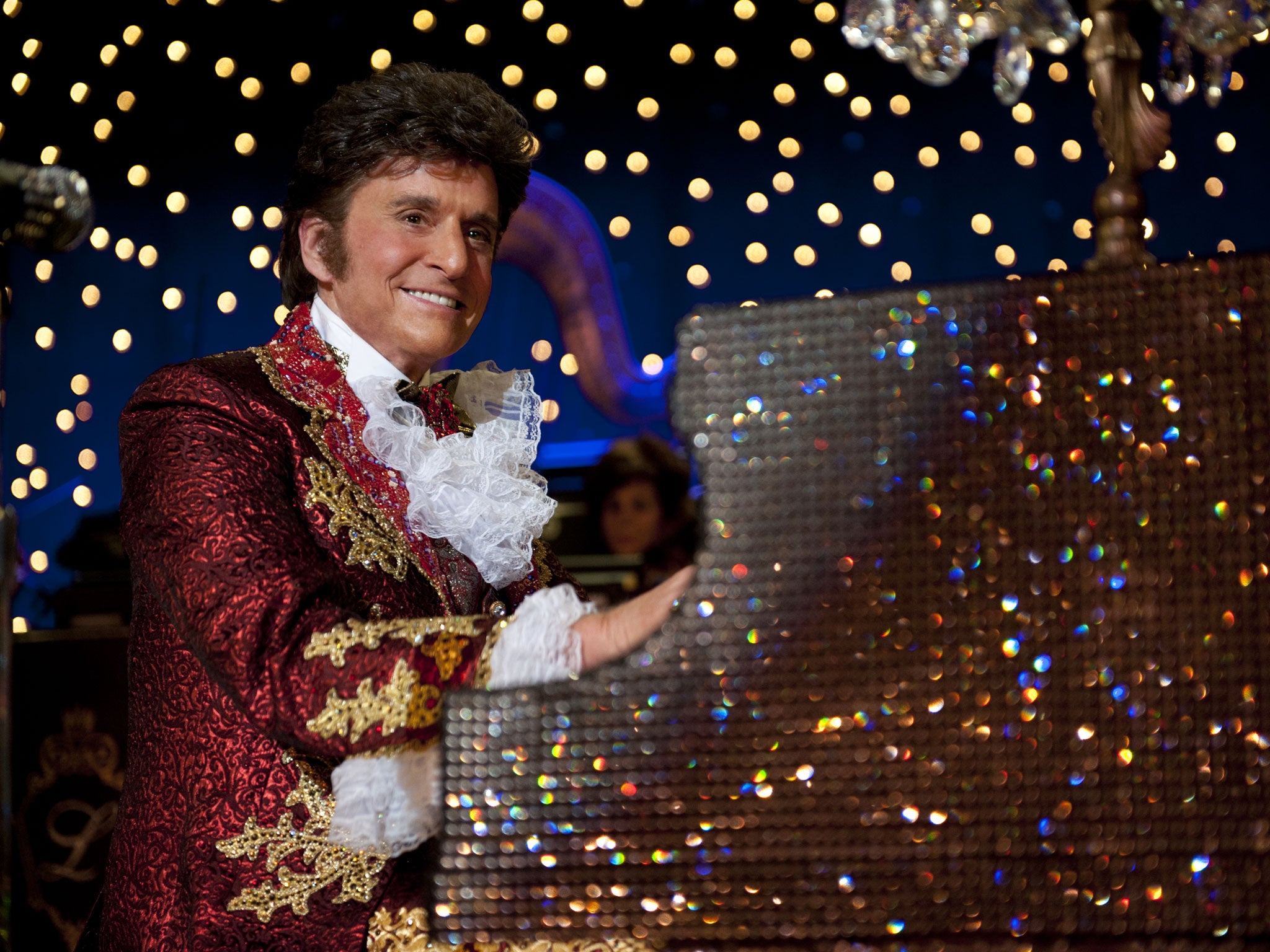Jonathan Romney on Steven Soderbergh's Behind the Candelabra: All hail, the queen of Hollywood
Michael Douglas's Liberace is more than mere mimicry – it's a brilliantly satirical homage

Steven Soderbergh says the Hollywood studios wouldn't let him make his film about Liberace, Behind the Candelabra, because execs felt it was "too gay". Too gay? Liberace? Who knew? Not the pianist's middle-American fans, apparently, even in the late Seventies. At the start of the film, a young man named Scott (Matt Damon) goes with his friend Bob (Scott Bakula) to a Liberace concert. The star is first spotted as a distant blur of pearly radiance, before we see him up close – played by Michael Douglas, his grin as dazzling as the piano's ivories. Liberace is a mind-boggling turn, whether playing boogie-woogie at 200mph or coyly flirting with an audience of besotted matrons. They're lapping it up – and apparently failing to see the big, be-sequinned, Schiaparelli-pink elephant in the room. "They have no idea that he's gay," Bob marvels.
If there was ever any doubt about the man born Wladziu Valentino Liberace – any doubt left by the feathered capes, the diamante-encrusted pianos and the sugar-frosted onstage patter – then Behind the Candelabra pretty decisively clears it up. Made as a TV film for HBO, but opulently suited to the big screen, Behind the Candelabra is unequivocally queer. There are bristling clone moustaches and Tom of Finland muscleman artwork in practically the opening shot, along with Damon bizarrely rejuvenated as an angelically gauche teenage hunk.
Damon plays Liberace's hapless lover Scott Thorson, on whose memoirs the film is based. Soon after the show, "Lee", as his friends call the star, is welcoming Thorson into his lavish mansion and listening to tales of his disadvantaged background. ("What a story," the star coos appreciatively. "It had everything but a fire in the orphanage.") Before long, Lee is employing Thorson as secretary and companion – and impressing the younger man with his insatiable appetites. They are, of course, very Hollywood appetites. After an energetic bout of sex, Lee lies back, pants and says: "We'll go shopping tomorrow".
Written by Richard LaGravenese, the film initially comes across as a high camp farce. Liberace may rail against being called an old queen, yet he takes queenliness to lengths unheard of since Marie Antoinette. As for Scott, he's cartoonish at first, as the consummate toyboy, and the sight of Damon in a white chauffeur's uniform, or in tiny diamante trunks, suggests something they cut from La Cage aux Folles for fear of overdoing it.
Soon, however, the film reveals a darker complexity. Real affection blossoms between the naive youth and his lover, 40 years older – but we soon discover the narcissistic lengths that Liberace will go to in order to put his brand on his beloved. He tells his plastic surgeon (a very funny Rob Lowe, his face puckered and pickled) that he wants Scott remodelled in his image: a mini-Lee, as it were. Scott is modified, the Liberace dimple inserted in his chin, and his features become a pumped-up non-specific blur of a face.
The film becomes increasingly poignant and painful, not least when dealing with Lee's attempts to deny the ageing process: when we first see him sans bouffant wig, it's a genuinely sad, shocking moment. This story depicts the historic roots of Hollywood's obsession with re-crafted looks – the immortality-chasing vanity that has since afflicted the entire affluent world. And it's a study of denial – Lee holding age at bay, and his mainstream audience swallowing the myth that he's heterosexual (or perhaps him swallowing the idea that they're swallowing it).
While the characters come to bleakly inglorious ends, there's a celebratory verve to a film that admires Liberace as much as it mocks him. It marvels at his technical dazzle, even if we're not invited to relish his bloodless music. And it digs his showmanship and sense of fun, offstage and on.
Soderbergh too is having fun with his actors. Damon plays it puppyishly ungainly, while Michael Douglas turns in a fabulous performance – delicate drawl, knowing moues, teeth gleaming under his pompadour – that's richer than just impersonation. Douglas is also unexpectedly fragile and touching, his hyper-macho image falling away in one twinkle of an eyelid. He's good too on the paranoia, the lechery, the fickleness, the tetchy tenderness towards his mother (a pricelessly odd Debbie Reynolds).
The film might have come across as a crude, cruel, even homophobic satire of Hollywood crassness, but in the end it's coldly revealing about the mating law of the whole showbiz jungle. It transcends gay and straight, this institution of trophy partners – briefly cherished, ultimately disposable lifestyle appendages. Scott and his ilk, male or female, become lapdogs to the stars – who themselves live in denial of the fact that they too, in their turn, are pampered but expendable pets to a fickle public.
Subscribe to Independent Premium to bookmark this article
Want to bookmark your favourite articles and stories to read or reference later? Start your Independent Premium subscription today.

Join our commenting forum
Join thought-provoking conversations, follow other Independent readers and see their replies